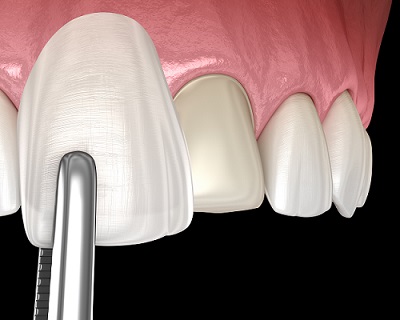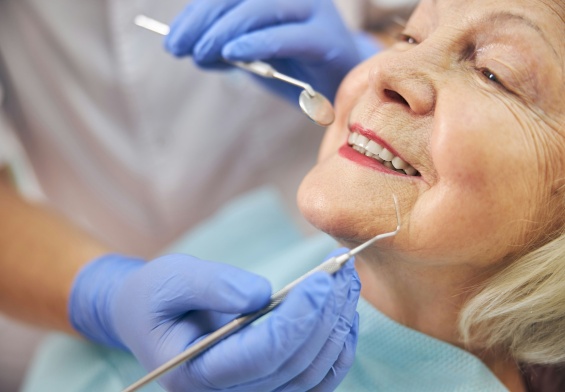The Newest Types of Dentures
If you’re new to the topic, it helps to first understand what dentures are before diving into the newest types available today. The newest types of dentures in 2025 include:
- Implant-supported dentures anchored to implants for stability.
- 3D-printed and digital dentures designed with CAD/CAM for precision and speed.
- Hybrid or fixed implant dentures (such as All-on-4) for permanent solutions.
- Advanced materials like zirconia, high-strength resins, and flexible bases.
- Modern attachment systems such as Locator, bar, and magnetic connectors
These advancements make dentures stronger, more natural-looking, and more comfortable. Dentures in Livingston NJ are now multifaceted – they can meet functional and esthetic needs.
Dentures have long been an essential solution for people who have lost some or all their teeth. For decades, the standard option was a removable acrylic plate that often slipped, felt bulky, or required messy adhesives. While effective in restoring smiles, those older dentures came with challenges that left many patients frustrated.
Your dentures today might look very different from your grandparents’ back in the day. Modern technology like digital dentistry, advanced materials, and implant systems have reshaped what dentures can be. Other innovations, like Invisalign for common dental issues, show how dentistry continues to expand treatment options for patients of all ages.
Searches for “what are the newest types of dentures?” are increasing because people want modern, reliable alternatives. For patients seeking dentures in Livingston NJ, understanding the latest innovations helps ensure they choose the best treatment for them. This guide explores each new option in detail, along with their benefits for local patients.
What Are Implant-Supported Dentures for Livingston, NJ Patients?
Implant-supported dentures are among the most significant improvements in modern dentistry. Instead of resting on the gums, these dentures attach securely to titanium implants in the jawbone. The result is greater stability and a stronger bite compared to traditional removable dentures.
Attachment systems include ball, bar, Locator, and magnetic designs. Ball attachments provide powerful initial retention, while Locators are stable and easy to use.
Bar systems distribute chewing forces evenly across implants. Meanwhile, magnets are the most simple.
For patients in Livingston NJ, implant-supported dentures are life-changing. They allow people to enjoy meals, laugh in public, and speak clearly without worrying about slipping prosthetics. The confidence that comes from knowing dentures are stable radiates into their quality of life.
Who Is a Candidate?
Candidates for implant-supported dentures usually have enough bone density to support implants. Patients in good health who want to avoid adhesives or loose dentures are excellent prospects. Maintenance typically involves regular checkups and occasional replacement of attachment components.
Pros and Cons
The biggest advantages are security, chewing efficiency, and comfort. Some patients also compare dentures vs implants as smile solutions, especially seniors who want to balance cost, comfort, and long-term results.But, treatment involves surgery and may cost more than traditional dentures. Still, the long-term benefits might outweigh the upfront costs.
What Are Digital and 3D-Printed Dentures?
Digital technology has changed every stage of denture creation. Instead of uncomfortable impression trays, dentists now use intraoral scanners to capture detailed images of the mouth. These scans are processed with CAD/CAM software to design dentures that fit precisely
The designs are then milled or 3D-printed from durable resin materials. This process ensures accuracy, reduces production time, and allows for easy replication if a denture is lost or damaged. Patients in Essex County enjoy shorter turnaround times and fewer office visits.
Esthetic Customization
Digital dentures can be customized to the patient’s liking. Tools like digital smile design and virtual patient modeling let patients see how their dentures will look before production. This makes the process more collaborative and increases satisfaction with the final result.
Real-World Example
Imagine a Livingston retiree who just broke their current set of dentures, so they need a quick replacement. Instead of waiting weeks, they can receive a 3D-printed denture in a fraction of the time. The convenience and precision make digital dentures a top choice for many local patients.
What Are Hybrid or Fixed Implant Dentures?
Hybrid dentures, also known as fixed implant dentures or All-on-4, are permanently attached to implants. Unlike removable prosthetics, patients cannot take them out. They function and feel much like natural teeth, making them one of the most advanced options available.
Step-by-Step Treatment Process
- Consultation and Assessment – The dentist evaluates oral health, bone structure, and patient goals. Digital scans provide a precise foundation for planning.
- Guided Implant Placement – Implants are positioned using 3D imaging and surgical guides for maximum accuracy
- Temporary Prosthesis – A set of provisional teeth may be provided, allowing patients to function while healing.
- Healing and Integration – Over several months, implants fuse with the bone, creating a stable base.
- Final Prosthesis – A permanent denture is securely attached, completing the transformation.
- Long-Term Benefits – Patients enjoy a strong bite, natural speech, and no need for adhesives.
For patients with more complex dental needs, a dentist may recommend full mouth rehabilitation, which can combine implant-supported dentures with other restorative treatments.
For patients in Livingston NJ, hybrid dentures provide unmatched convenience and esthetics. Of course, costs and the invasiveness of surgery are factors, but many patients find the long-term comfort worth it.
How Have Denture Materials Improved?
Modern dentures enjoy materials that are far superior to those used decades ago. Older acrylic bases were prone to staining and breakage. Today’s options include high-strength resins, flexible bases, and zirconia.
Zirconia Dentures
Zirconia dentures are incredibly durable and resistant to fractures. They also provide excellent esthetics, with a natural translucency that mimics real teeth. For patients seeking premium results, zirconia is often the material of choice.
Flexible Dentures
Flexible bases, such as Valplast, are lightweight and adapt closely to the contours of the mouth. They are ideal for patients with sensitive gums or those who dislike the bulk of traditional acrylic.
These material advances mean dentures can now last longer, look more realistic, and feel more comfortable. For Essex County residents, this translates into better long-term satisfaction.
What Are Modern Attachment Systems for Overdentures?
Any overdenture placement is only as good as its attachment systems. Modern designs focus on improving stability, retention, and ease of maintenance.
Types of Systems
- Ball attachments: Strong early retention but may need maintenance over time.
- Locator attachments: Balanced retention, user-friendly, and widely used in North America
- Bar systems: Distribute pressure evenly, protecting implants from overload.
- Magnetic systems: Simple and durable, popular in parts of Asia and Europe
Patient Satisfaction
Studies show that ball attachments provide excellent short-term grip, while Locators excel in long-term usability. Patient satisfaction often depends on personal priorities, such as ease of cleaning versus strength of hold. In Livingston, many dentists recommend Locators for their consistent performance.
How Is AI Changing Denture Design?
Artificial intelligence is emerging as a powerful tool in prosthodontics. AI can analyze digital scans and suggest the ideal tooth size, alignment, and bite design for each patient.
This creates highly personalized dentures that improve both function and esthetics.
Virtual Simulations
Patients can preview their smile through digital simulations before treatment begins. This helps set realistic expectations and ensures the design aligns with personal goals.
Streamlined Workflows
AI also supports fully digital workflows, reducing errors and shortening treatment timelines. For Livingston patients, this means fewer appointments and faster results with better accuracy.
Which Denture Type Fits Different Needs?
| Denture Type | Best For | Key Benefits | Considerations |
| Implant-Supported | Patients with loose dentures, enough bone support | Strong bite, secure fit, improved speech | Requires surgery, higher cost |
| Hybrid/Fixed (All-on-4) | Patients wanting a permanent, teeth-like solution | Closest to natural teeth, no adhesives needed | Surgical procedure, higher price |
| Digital/3D-Printed | Patients valuing speed and precision | Quick turnaround, accurate fit, digital previews | May need replacement sooner |
| Zirconia | Patients seeking strength and esthetics | Extremely durable, lifelike appearance | More expensive than resin/acrylic |
| Flexible/Valplast | Patients prioritizing lightweight comfort | Less bulky, adapts to mouth contours | Not as strong as rigid options |
Key Takeaways for Patients in Livingston NJ
Each modern denture type offers unique benefits. Implant-supported and hybrid dentures provide stability and natural function, but they need surgery and a larger investment. For patients frustrated with loose dentures, these are often the best long-term options.
Digital and 3D-printed dentures stand out for speed and precision. They are ideal for patients who want fast results or to replace broken dentures quickly. Though they may not last as long as zirconia, they provide convenience without sacrificing comfort.
Material matters too. Zirconia offers durability and esthetics for patients seeking a premium solution. Flexible dentures focus on comfort and a lightweight feel.
For anyone considering dentures in Livingston NJ, the best choice depends on health, lifestyle, and budget. A local consultation ensures that patients receive guidance tailored to their goals. Durability, comfort and speed are all important.
What Does the Future of Dentures Look Like?
The future holds exciting possibilities. Research into biocompatible polymers promises lighter, longer-lasting dentures with reduced irritation. These improvements will help dentures last longer and feel more natural. Some experts even predict that the future of dentures may involve real teeth, as regenerative dentistry advances further.
Immediate loading protocols, where dentures are attached shortly after implant placement, are becoming more common. This reduces waiting times and improves convenience for patients. Global research is also exploring nanomaterials and minimally invasive techniques to enhance outcomes.
For patients in Livingston NJ, these innovations mean the line between dentures and natural teeth continues to blur.
Choosing Dentures in Livingston NJ
Deciding on dentures requires more than comparing prices. Comfort, durability, appearance, and long-term satisfaction are equally important. While traditional dentures remain available, modern designs often deliver far better results.
Dentists in Essex County now offer digital scanning, 3D printing, and implant-based options that reflect the best of modern prosthodontics. Whether patients need a fast replacement, a permanent solution, or a flexible option, local providers can deliver.
For anyone considering dentures in Livingston NJ, a consultation with a general and cosmetic dentist is the best way to explore these new technologies. Personalized guidance ensures the final choice supports both health and confidence.
What You Should Know About Dentures in Livingston, NJ
Dentures in 2025 are far more advanced than the bulky plates of the past. Implant-supported designs, digital and 3D-printed fabrication, hybrid fixed dentures, and improved materials have revolutionized treatment. Attachment systems and AI-driven customization make these options more reliable and esthetic.
For patients seeking dentures in Livingston NJ, these innovations provide comfort, strength, and natural beauty. Meeting with a skilled dentist ensures access to the right solution, whether it’s a flexible partial, a zirconia prosthesis, or a permanent implant-supported denture. With today’s technology, restoring a confident smile has never been more achievable.
Resources
Abdelnabi M H, Swelem A A (September 19, 2024) 3D-Printed Complete Dentures: A Review of Clinical and Patient-Based Outcomes. Cureus 16(9): e69698. doi:10.7759/cureus.69698
Auduc C, Douillard T, Nicolas E, El Osta N. Fully Digital Workflow in Full-Arch Implant Rehabilitation: A Descriptive Methodological Review. Prosthesis. 2025; 7(4):85. https://doi.org/10.3390/prosthesis7040085
Bors A, Mucenic S, Monea A, Ormenisan A, Beresescu G. From Conventional to Smart Prosthetics: Redefining Complete Denture Therapy Through Technology and Regenerative Science. Medicina (Kaunas). 2025;61(6):1104. Published 2025 Jun 18. doi:10.3390/medicina61061104
Iosif L, Țâncu AMC, Amza OE, Gheorghe GF, Dimitriu B, Imre M. AI in Prosthodontics: A Narrative Review Bridging Established Knowledge and Innovation Gaps Across Regions and Emerging Frontiers. Prosthesis. 2024; 6(6):1281-1299. https://doi.org/10.3390/prosthesis6060092
Sardar C, Mistry G, Randhawa NK, Puppala P, Chitnis A, Sachdev SS. An update on attachment systems for mandibular implant overdentures: A review. Bioinformation. 2024;20(11):1623-1628. Published 2024 Nov 30. doi:10.6026/9732063002001623




